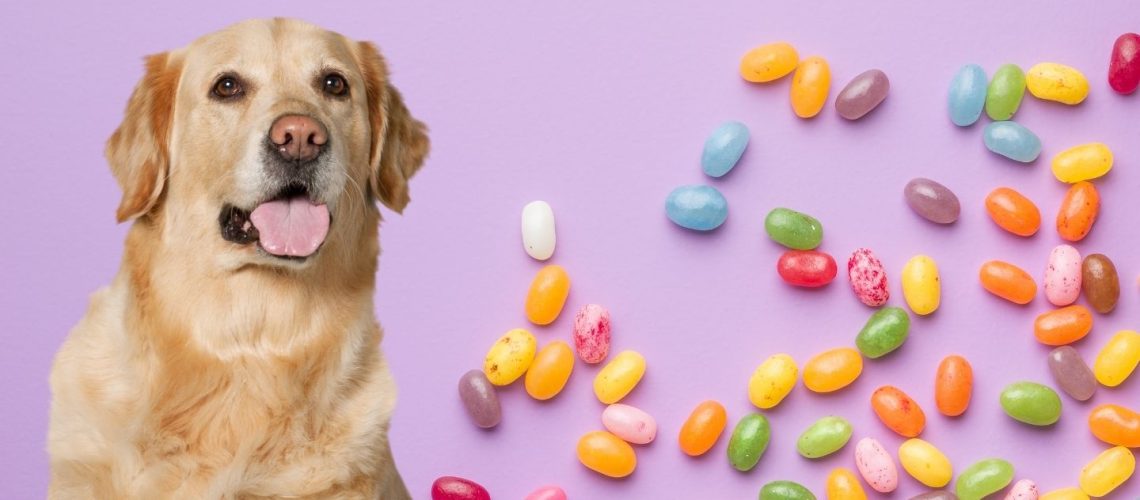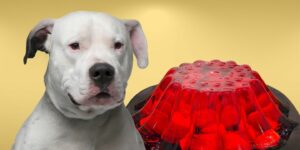Can Dogs Eat Jelly Beans?
No, dogs should not eat jelly beans. These popular sugary treats may seem like a harmless snack for humans, but they can be quite dangerous for dogs. Consuming jelly beans can lead to several health issues in dogs, including xylitol poisoning and caffeine toxicity. In this article, we'll discuss the ingredients in jelly beans, why they're harmful to dogs, and how to prevent accidental ingestion. Additionally, we'll provide some safe treat alternatives for your furry friend.
The Ingredients of Jelly Beans
Jelly beans contain various ingredients that can be harmful to dogs. The main dangers are artificial sweeteners like xylitol, as well as the presence of caffeine in some jelly beans.
Sugar and artificial sweeteners
While sugar isn't toxic to dogs, consuming too much of it can cause health problems such as obesity, dental issues, and diabetes. Some jelly beans also contain artificial sweeteners – notably, xylitol, which is extremely dangerous for dogs.
Artificial colors and flavors
Jelly beans often contain artificial colors and flavors that can cause gastrointestinal issues and allergic reactions in some dogs.
Caffeine content
Some jelly beans contain caffeine, which can be harmful to dogs if ingested in significant amounts.
The Dangers of Xylitol
Xylitol is a sugar substitute that is safe for humans, but extremely toxic to dogs.
How xylitol affects dogs
When dogs consume xylitol, it causes a rapid release of insulin, leading to hypoglycemia (low blood sugar). This can result in various dangerous symptoms.
Symptoms of xylitol poisoning
If your dog has consumed xylitol, signs may include vomiting, loss of coordination, and seizures. Immediate medical attention is required if your dog exhibits any of these symptoms.
Treatment for xylitol poisoning
There is no specific antidote for xylitol poisoning, but your veterinarian can provide supportive care to help your dog recover, such as fluid therapy and monitoring blood sugar levels.
The Dangers of Caffeine
Caffeine can also pose a significant threat to dogs if ingested in large enough quantities.
How caffeine affects dogs
Caffeine toxicity in dogs can cause dangerous side effects like restlessness, high body temperature, elevated heart rate, and seizures.
Symptoms of caffeine toxicity
Signs of caffeine toxicity in dogs may include restlessness, panting, rapid heartbeat, and muscle tremors. If your dog displays any of these symptoms, seek prompt veterinary attention.
Treatment for caffeine toxicity
There is no specific antidote for caffeine toxicity in dogs, but your veterinarian can provide supportive care, including administering IV fluids, medications to control heart rate, and sedatives if needed.
Other Harmful Ingredients in Jelly Beans
In addition to xylitol and caffeine, other ingredients in jelly beans can also be harmful to dogs, like artificial colors and flavors, as well as their high sugar content.
How to Prevent Accidental Ingestion
To keep your dog safe from jelly beans:
- Properly store jelly beans and other candies in a location that's out of your dog's reach.
- Train your dog to avoid harmful foods and only accept treats from you or other designated caregivers.
Recognizing the Signs of Ingestion
Monitor your dog's behavior and look for physical symptoms like vomiting, diarrhea, and unsteady coordination, which may indicate that they have ingested jelly beans or other harmful foods.
Emergency Response
If your dog has consumed jelly beans, promptly call your veterinarian for advice. They may need you to bring your dog in for examination or suggest first aid measures to perform at home.
Safe Treat Alternatives for Dogs
Consider offering your dog safer treat alternatives, such as:
- Fresh fruits and vegetables like apple slices, carrots, and green beans.
- Homemade dog treats made from dog-safe ingredients.
- Commercially made dog treats designed for canine consumption.
Educating Others on Dog Safety
Share information about the dangers of jelly beans with fellow dog owners and raise awareness on social media to help protect other dogs from accidental ingestion.
Conclusion
Dogs should not eat jelly beans or any other candy containing xylitol or caffeine. Keep your dog safe by monitoring their diet, providing safe treat alternatives, and educating others about the hazards of certain human foods for dogs.











